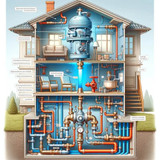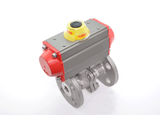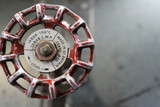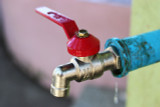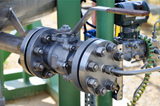Carbon Steel Valves
Carbon steel valves are strong, durable valves that can help improve your systems and applications. Let's take a closer look at what the carbon steel valve has to offer and why you should consider it for your next project.
What Is a Carbon Steel Valve?
A carbon steel valve is not a specific type of valve. Rather, it is any valve made of carbon steel. Carbon steel consists mainly of carbon and iron, giving it a hard, durable aspect that makes it ideal for a range of applications.
What Are the Common Applications of Carbon Steel Valves?
Since carbon steel valves are so durable and versatile, they find uses in a wide array of different applications. Some of these may include the following:
- Oil and Gas Industry: In this industry, carbon steel valves may be used in refineries and pipelines to control the flow of oil and gas.
- Power Generation: Power-generating plants often use carbon steel valves to control the flow of water, steam, and other liquids and gases.
- Water and Wastewater Treatment: Water and wastewater treatment plants incorporate carbon steel valves to help control the flow of water. They also use them to help ensure that the chemicals used get released at the appropriate times.
- HVAC Systems: HVAC systems may use carbon steel valves to control the influx and outflow of gases and liquids.
- Mining Industry: The mining industry may use carbon steel valves to help ensure that they can appropriately control the flow of wastewater and other liquids.
Carbon Steel Valves - Available Materials and Sizes
Carbon steel valves, unlike many of the other valves we stock at Valveman, only come in a single material type. However, there are different grades of carbon steel.
These valves also come in a wide array of sizes, ranging from small sizes like quarter-inch all the way to twelve inches.
The endings may vary significantly and include options like threaded, socket weld, butt weld, and hinged. It's essential to know exactly what kind of valve you need before buying.
What Are the Advantages of Using Carbon Steel Valves?
There are a wide array of benefits and advantages to using carbon steel valves. Some of these include the following:
- Corrosion resistance - Thanks to the unique properties of carbon steel valves, they have a high resistance to corrosion.
- Versatility - Carbon steel valves can be used for a wide range of applications and in many different kinds of systems.
- Cost-effectiveness - Because they're so durable and last so long, you won't need to replace carbon steel valves as often. This means that, in the long term, they're more cost-effective.
- High pressure ratings - Because carbon steel valves are so strong and durable, they can handle exceptionally high pressure levels compared to some other material types.
- Low maintenance - Since they have high resistance to corrosion and aren't prone to any problems, carbon steel valves generally require very little maintenance.
- Compliance with industry standards - Carbon steel valves generally comply with the required industry standards and certifications. You can rest assured that you're getting reliable products of high quality.
- Readily available - Because they're so easy to machine, carbon steel valves are generally readily available. You won't find it difficult to find the type and size required by your application.
Frequently Asked Questions (FAQs)
How Do I Select the Right Carbon Steel Valve for My Application?
There are a few elements to take into account when choosing the best carbon steel valve for your application. However, the application itself should always be the primary factor. It's a good idea to specify the application and consider issues like:
- What the system will transport.
- How big is the pipe for the system?
- What is the flow rate and pressure rating for the application?
- Are there special temperature requirements for the application?
- Do you need the valve to be actuated manually or remotely?
The size of the valve to purchase, the material from which it should be made, and the type of actuator it has to have can all be determined by the answers to these questions.
How Should Carbon Steel Valves Be Maintained?
When you use carbon steel valves, they generally require only minimal maintenance. Carbon steel is hard and not prone to corrosion or heavy wear. However, it may be wise to check valves periodically to ensure that there's no debris buildup.
In some cases, valves may also require lubrication to keep them running smoothly. However, in the end, it largely depends on the system the valve is being used on. Systems dealing with more debris or impurities are more likely to require regular valve maintenance (like cleaning).
Where Can I Buy Carbon Steel Valves?
No matter what kind of carbon steel valve you require for your application, you can get it right here at ValveMan. We stock a wide range of different valves in an array of materials and sizes. From butterfly valves to ball valves, stainless steel to carbon steel, we've got you covered.
Our Posts
View AllTypes of Valves in Plumbing
Have you ever wondered what goes into managing the flow of water in your home, or through a building …
Read MoreIntroducing Apollo Valves
Apollo Valves® inventory includes a wide range of valve products supplied to diverse markets. Th …
Read MoreUnderstanding Valve Sizes and Measurement
Sizing the appropriate valve is critical to ensuring the performance of your system. Whether you'r …
Read MoreTypes of Water Valves
Hey there, fellow valve enthusiasts! We all know that valves play a crucial role in regulating th …
Read MoreWhat is a Backflow Preventer, and How Does it Work?
When a simple check valve is inadequate for the job, you need a backflow preventer. But knowing …
Read MoreValve inspection - main points of valve testing in Manufacture setting
Industrial facilities rely on different types of valves (such as check valves, for example) to con …
Read MoreTypes of Ball Valves
Ball valves are important components in a vast range of systems, from small family-owned workshops …
Read MoreUnderstanding valve standards and specifications
Hey there, fellow valve enthusiasts! Today, we're looking at valve codes, standards and specifica …
Read MoreHow to Tell if a Valve is On or Off
We have all been there before. You are staring at a valve; you know that you should know if it …
Read MoreUnderstanding Different Types of Valve Connections and Fittings
Hey there, fellow valve enthusiasts! We know valves play a crucial role in regulating the flow of li …
Read MoreTypes of Valve Handles: Lever and Handwheels
Whether you're involved in industrial work, plumbing, or you're a DIY enthusiast, you come across va …
Read MoreThe Basic Parts of a Valve
Valves quietly work in many different areas, even places you wouldn't expect. They're truly every …
Read MoreGas Ball Valves In Industrial Applications - 5 Things to Keep in Mind
Unlike the standard ball valves, most gas ball valves are tested and approved by CSA. These valves a …
Read MoreHow To Correctly Use A 3 Way Valve In Different Applications
To understand the "T"-port and an "L"-port 3-way valves and what makes them different, it's importan …
Read MoreIndustrial Ball Valves - 9 Questions To Make The Right Choice
Ball valves are versatile flow control devices suitable for extensive industrial applications. They …
Read MoreEverything you need to know about valve types
Valves play crucial roles in production lines and equipment performance across a multitude of ind …
Read MoreWhat is a Duty Cycle and How Does it Relate to Electric Ball Valves?
Electric actuation improves the efficiency of processes by maintaining the accuracy of the re …
Read MoreActuated Butterfly Valves 101: All You Need To Know About Their Application In Piping Systems
Butterfly valves are quarter-turn flow control or isolation devices, used for quick shut-off in p …
Read MorePractical Guide To Electric and Pneumatic Actuators – Which One To Choose?
While electrical and pneumatic actuators have several unique benefits and are preferred in differ …
Read MoreHow Do Check Valves Affect Water Pressure in the Piping System?
Check valves also known as "one-way" valves are autonomously operated unidirectional valves that all …
Read More



